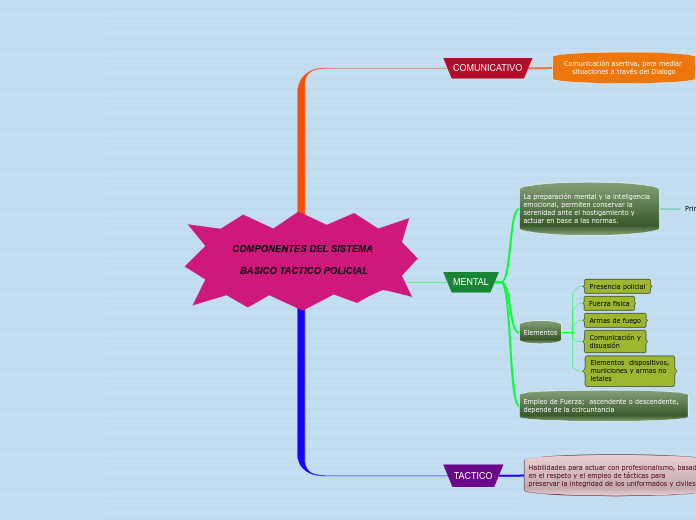arabera Ximena Arrieta 3 years ago
5449
COMPONENTES DEL SISTEMA BASICO TACTICO POLICIAL

arabera Ximena Arrieta 3 years ago
5449

Honelako gehiago

To name your story, you have to think about the overall message and what you want your audience to understand from the story. Also, make it relevant and easy to remember.
The ending of a story is essential. We all know that if the ending is weak, what happened before loses its importance. So make it unpredictable, but fair. A resolved ending answers all the questions and ties up any loose threads from the plot.
This is the moment when the main character surpasses the last obstacle and finally faces their greatest challenge.
The climax usually follows one of these patterns:
Type in your answer.
Valoración táctica de Amenazas y riesgos
Se identifican los posibles riesgos y amenazas que puedan presentarse en el procedimiento y afecten a las partes
Proceso de pensamientos
Se analiza la situación y se actúa bajo la ética y la moral , preservando los derechos fundamentales
Control
Mediar con el dialogo, tratando de calmar la situación, evitando a toda costa agresiones físicas y verbales.
In the beginning of the story (or the exposition), you will need to introduce the setting and characters. You might also want to introduce the main conflict. This part of the story is important because it gives the reader necessary background information and maybe even a first insight into a character’s personality.
Characters are essential to a good story. Usually, the protagonist(s) is/are the most affected by the plot. Introduce a character by focusing on their actions, interests, and occupation, as the physical appearance doesn't make a difference in most cases.
Type in the name of your character.
Legalidad
Which traits best describe the character's personality? Choose more if necessary:
Temporalidad
What is your character's main goal?
Necesidad
Choose the type of your chacter:
Racionalidad
Add other properties of the character.
Proporcionalidad
Add other qualities/attributes of the character.
The middle of the story is where you add layers of complications that will lead to the end. Reveal more about the character's journey. Did their personality go through changes? How did they overcome the challenges? And as you build up the story’s central conflict, make it more personal to that character. Also, from the middle act, you have to lead into the final act.
Each story has a main character and that character usually needs to solve a problem or challenge. The character's challenge is the one that creates tension throughout the story.
In most stories, there are 3 challenges. The number 3 is a mystical number symbolizing completeness. Try to come up with interesting challenges with which your character needs to struggle.
See a few examples below:
Type in any other challenges which other characters in the story need to face.
Capacidad de resolver conflictos
Agudiza la escucha activa